You might have heard that alcohol in Jordan isn’t quite as strictly controlled as most other Middle Eastern countries. And you’ve heard correctly. But don’t pop that bottle of champagne just yet.
Drinking in Jordan is not exactly straightforward or painless. There are plenty of things you need to know to consume safely and respectfully when in the Kingdom of Jordan.
You’re in luck, though, as I’ve explained everything for you here in this article about alcohol in Jordan. So read on to learn what to expect when visiting Jordan when it comes to beer, wine, and spirits.
Note: this article contains affiliate links, which means that should you purchase something or get a quote through them I may make a small commission at no additional cost to you. This helps keep the site running with up to date information. I do not represent World Nomads, Booking.com, or Discovercars.com. This is information only and not a recommendation to buy the product mentioned in this article.
Alcohol Laws in Jordan
Let’s start with the legal stuff.
Is alcohol legal in Jordan?
It sure is. This isn’t Saudi Arabia. While Jordan has established Islam as its national religion, it is not a theocracy or a dictatorship and has an actual constitution. The legal drinking age is 18, just like almost every other country in the world.
Jordan’s legal system mixes civil law and Islamic law, which is in stark contrast to many other Middle Eastern countries who govern solely on Islamic law. What this does is create a society that is more tolerant of things that are forbidden in Islam (like alcohol). Jordan has always had a significant Christian minority who have been able to live peacefully in the country.
Jordan is definitely one of the more “liberal” Middle Eastern countries. I put that in quotation marks since liberal is relative. It’s still a conservative society on a global scale, but no one is getting arrested for not wearing a hijab in Jordan.
So yes, alcohol is legal, yet regulated. Drinking in public – like on the street – is strictly prohibited. There is zero tolerance for driving after drinking. And being visibly intoxicated in public can also be problematic.
We will get a bit more into the regional differences across the country in alcohol usage and availability a bit later. But let’s start with where you can find alcohol and how much it costs.
Establishments that can sell alcohol
When it comes down to it, drinking in Jordan isn’t that much different than drinking in a western country. There are bars and restaurants in the cities that serve alcohol. If you want something for home, then you head to a liquor store.
There is one key difference, however, and that is that there is minimal demand for alcohol in Jordan. Islam prohibits alcohol consumption, and since about 90% of the country is Muslim, that really hinders the demand for booze.
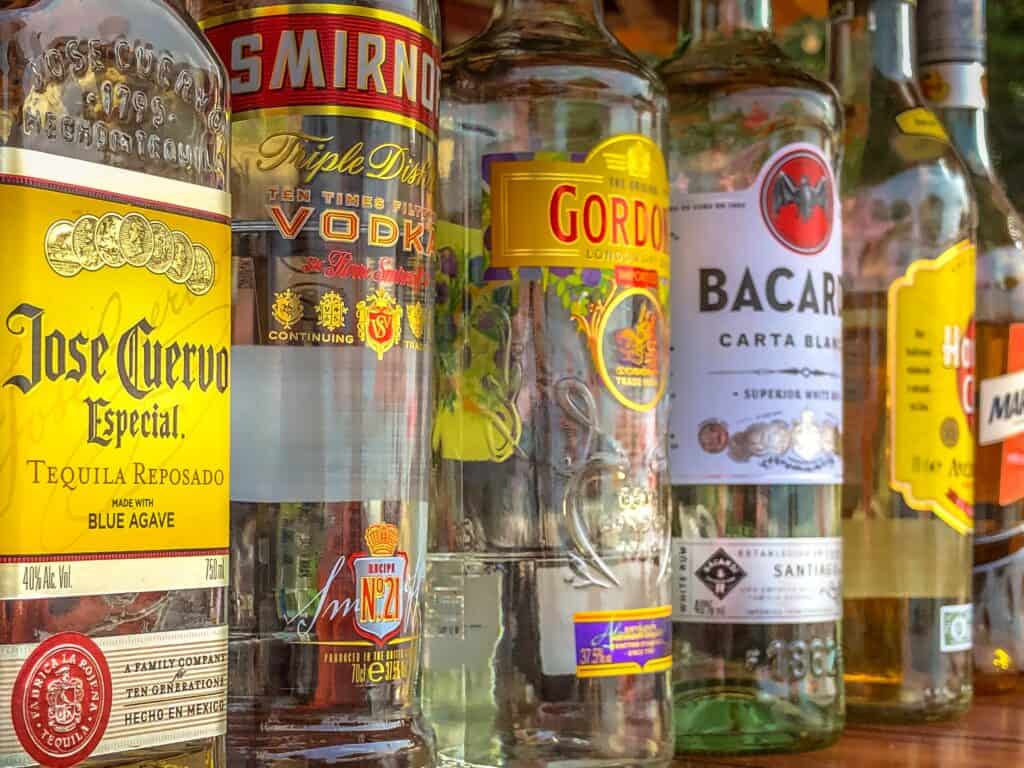
Now, of course not all Muslims follow the religious rules, but the majority do. While any restaurant can get a liquor license to sell alcohol, most don’t, mainly because it’s just not worth it. The demand for alcohol is so low that most establishments don’t even bother.
Where the alcohol demand comes from is tourists, expats, and the non-Muslim minority. In Amman, it’s not hard to find a place that serves alcohol and you probably even see a few locals drinking with you.
Alcohol taxes
There are no specific taxes you pay on personal alcohol consumption in Jordan. Everything you order or buy will be subject to a 16% goods and services tax, however, which is standard across the country.
The government of Jordan doesn’t publish the tax rates for alcohol wholesale (like a distributor providing to restaurants or liquor stores), but we know it’s pretty significant, as alcohol prices in Jordan are quite high. Importers also pay significant customs levies on imported alcohol. So anything brought in from overseas will be even more expensive.
Ramadan
During the Muslim holy month of Ramadan there is no alcohol sold throughout the country to anyone. Doesn’t matter if you’re not Muslim and you didn’t know it was Ramadan. All liquor stores will be closed and restaurants won’t be able to sell you any alcohol. The only exception is nicer western hotels (mostly the 5-star ones), that are still allowed to serve alcohol at their bars/restaurants during Ramadan.
Ramadan will also make the rest of your trip far more challenging, as plenty of other things are closed as well, including nearly everywhere that sells food until the sun sets. Be sure to check the exact dates of Ramadan before planning your trip to Jordan, as it changes every year.
Jordanian Alcohol Production
Jordan actually produces more alcoholic beverages locally than you might expect. Unlike other Islamic countries like the UAE, which literally just allowed alcohol production in the country in 2023, Jordan has made adult beverages for ages. Below we go through the local drinks you can enjoy in Jordan.
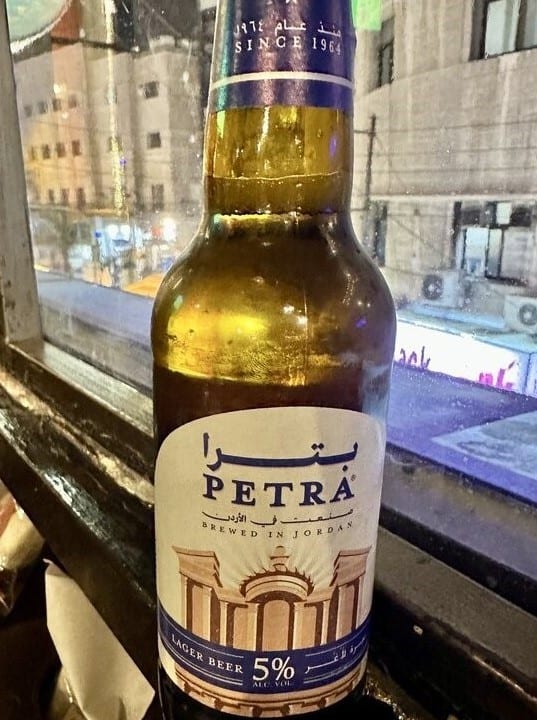
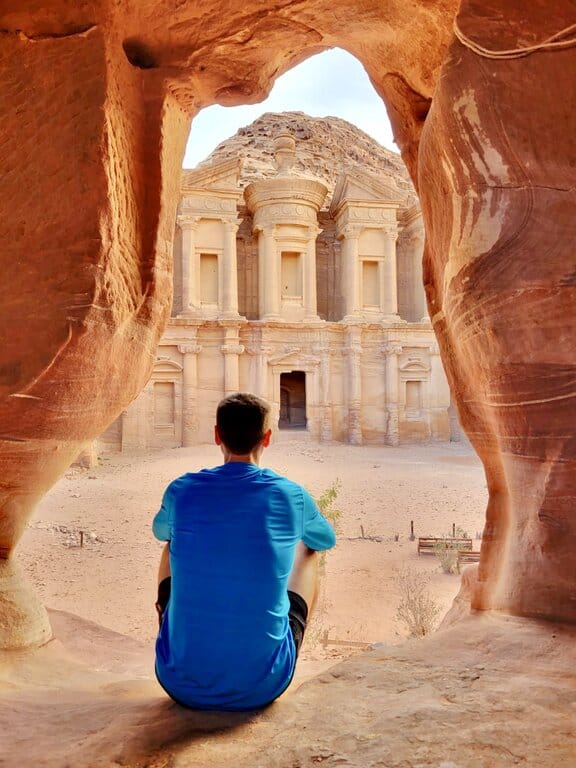
Beer
Jordan has two breweries that brew beer locally. You can also find Budweiser, Heineken, Peroni, Corona, and other imported mass produced beers.
General Investment Company
It might not sound like a brewery, but General Investment Company is Jordan’s original macrobrewery. They make two beers: Petra and Amstel. Petra is a standard German-style lager that comes in a variety of ABV contents (all the way up to a painful 12%!), and it’s (obviously) named after Jordan’s famous archaeological site of Petra.
Amstel is a local production of Amstel from Amsterdam. While big breweries like Heineken have local breweries all over the world, Jordan was the first country to produce Amstel outside of the Netherlands and it’s been making Amstel ever since its opening in 1958. Amstel’s deal with General Investment Company allows the Jordanian company to produce beer under the Amstel name locally.
If you’re somewhere in Jordan that has beer on draft, chances are it’s Amstel or Petra (or both).
Carakale Brewing
Carakale is Jordan’s first (and hopefully not their last!) craft brewery. The brewery in Amman is not run by expats, but by born and bred Jordanians who are doing their best to bring the craft beer revolution to the Middle East. They’re off to a good start, producing dozens of different beer varieties.
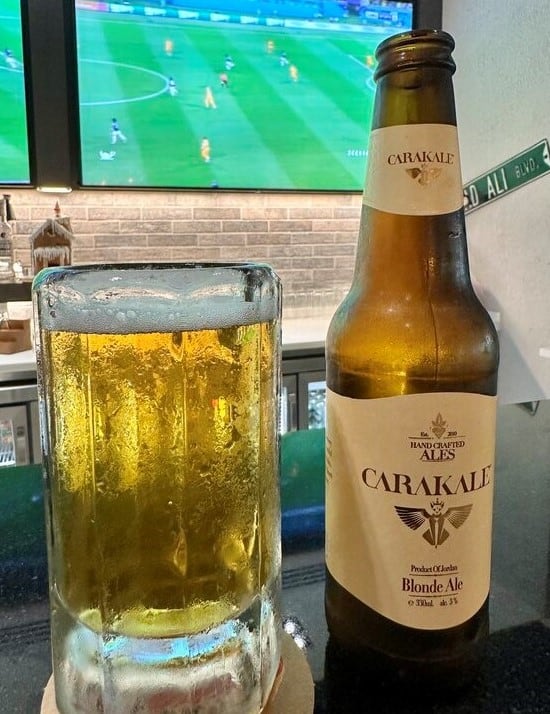
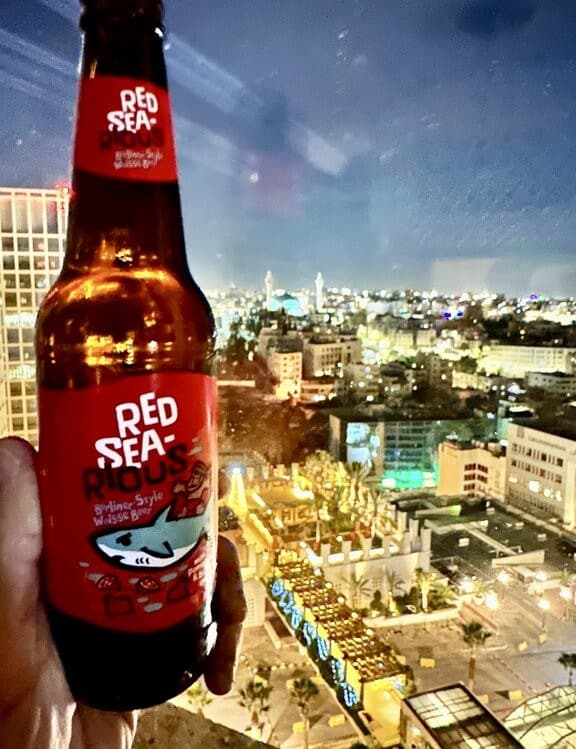
You’ll find Carakale beers at any liquor store or at hotel restaurants/bars and some of the nicer establishments in Amman and Aqaba. It’s not much more expensive than Amstel so might as well give it a shot if you see it!
Wine
Jordan also has two wineries and they both actually produce some damn good wine! Wine has been consumed in Jordan since biblical times. This is the land of Jesus after all. They don’t turn water into wine these days, but Jordanian winemaking is alive and well.
Jordan River and Saint George are both located north of Amman near the Syrian border, where the land is more fertile for grape cultivation. Both wineries are locally owned by Jordanian families and have been in operation since last century.
You can find Jordan River and Saint George wines at liquor stores and any restaurant or bar that serves wine. It will usually be noticeably cheaper than imported wines.
Spirits
Rum and tequila in the desert? You betcha! All sorts of hard liquors are produced and bottled in Jordan. While there is certainly no sugarcane or agave plants growing in the deserts of Jordan, ingredients to make rum, tequila, and other spirits like vodka and whiskey are imported to distill and produce the liquor locally.
The two main distilleries in Jordan are Haddad Distilleries and Eagle Distilleries. You’ll likely run across them if you’re a spirits drinker. Bars will also be stocked with the usual suspects like Johnny Walker, Grey Goose, and Bombay Sapphire, among others.
This part of the world is also known for arak. This is a local liquor made from grapes and aniseed. It can be found all over the Levant and the local distilleries make their own versions of it. If you want to try some truly Middle Eastern alcohol, arak is the way to go.
Where to Buy Alcohol in Jordan
To purchase alcoholic beverages for personal consumption you’ll have to go to a liquor store (sometimes also referred to in Jordan as a “bottle shop”). Only non-alcoholic beverages are sold at supermarkets. Restaurants and bars also serve alcohol, but not all restaurants. Most don’t, so if you’re looking for a drink with your meal it’s best to check first.
Amman
Liquor stores can only be found all over Amman. They operate just like in any western country, but are usually open till midnight or 2 AM. I recommend Dababneh Wines and Spirits. They have a good selection and knowledgeable staff.
Restaurants are hit or miss in terms of who has alcohol and who doesn’t. Ones that do will often advertise that they do in order to attract tourists. Most restaurants do not have a liquor license so don’t expect anywhere you stop to serve alcohol.
The more upscale a place is, the more extensive alcohol options they will have. Most of the bars and restaurants that serve alcohol are concentrated around Rainbow Street in central Amman.
Restaurants in international brand hotels like the Grand Hyatt Amman and the Amman Marriott will have extensive drink menus. Restaurants in other upscale hotels will also serve alcohol. Smaller, mom-and-pop hotels and guesthouses will likely not, so check before you book if access to a nightcap is important for you.
Aqaba
Like Amman, there are plenty of liquor stores in Aqaba. But Aqaba has a one particular benefit that the rest of the country does not have: it’s a tax-free zone. Known as the Aqaba Special Economic Zone Authority, you don’t have to pay GST on things you buy in Aqaba. When it comes to alcohol, this will save you about 40% from purchasing the same thing anywhere else in Jordan.
Like Amman, many restaurants in town and the restaurants in nice hotels like the Intercontinental or the DoubleTree by Hilton will serve alcohol. Aqaba is more of a resort city, so it has a greater ratio of tourists to locals than Amman. So you’ll find less restaurants that do not serve alcohol in Aqaba. Still check first, though.
If you plan on stocking up on booze in Aqaba for the rest of your trip in Jordan, just note that legally you’re limited to carrying around either 6 servings of beer or 1 bottle of liquor per person in Jordan, including in your car. While you’re not going to get stopped and searched in most of the country, you will in Aqaba.
There are customs checkpoints on the roads out of the Aqaba Special Economic Zone and your vehicle will be searched. So if you’ve stocked up on alcohol you’re going to have to give most of it back. This is the downside of the special tax-free zone.
PRO TIP: Stock up on alcohol for your trip from Amman or northern Jordan only. Do NOT purchase more than 6 beers or one bottle of liquor from Aqaba with the intention of carrying it around the country.
Other Jordanian Cities
Other cities in Jordan that are less frequently visited by tourists, such as Zarqa, Irbid, and Madaba also have liquor stores, though maybe not in the quantity of Amman and Aqaba, with the strict exception of Madaba, which seems to have a ton.
The Jordanian Countryside
Outside of the cities in Jordan the tune changes drastically. The Jordanian countryside is far more conservative than the cities, and even with the influx of tourists in recent decades, alcohol is still hard to come by.
Not including Jerash, where most people just visit as a day trip, there are three main regions that tourists flock to on their trip to Jordan: Petra, Wadi Rum, and the Dead Sea. Each is quite different when it comes to alcohol so I’ll explain the situation at each location here.
Petra and Wadi Musa
Petra is Jordan’s most famous and most popular tourist attraction. It’s located just outside the town of Wadi Musa in southwest Jordan. With all the international tourists that have flocked to Petra in recent years, alcohol has now become available at a few places in Wadi Musa. There are no liquor stores, so it’s only possible to order a drink at a restaurant or bring in from the cities.
The Mövenpick and the Marriott hotels both have bars that serve alcohol. Outside of that, The Cave Bar in the Petra Guesthouse Hotel and Kilkenny Bar are the only real places to go for a drink outside the park. Petra Guesthouse Hotel does operate a restaurant inside of Petra that serves beer, however. Nothing like having a Petra beer at Petra itself!
Outside of that short list if you find somewhere selling real, legitimate beer then let me know by leaving a comment on this post. There are many places that sell nonalcoholic beer, and even some places that try to scam you into thinking you’ve ordered a real beer then give you nonalcoholic.
Whatever you do, avoid the Plaza Pizza restaurant at the entrance to Petra at all costs. They are notorious for tricking tourists into thinking they’re ordering a real beer then giving them nonalcoholic and charging them $12.

Wadi Rum
The Wadi Rum desert is one of the most stunningly beautiful places on earth. Few people visit Jordan without spending at least one night in Wadi Rum. Wadi Rum is essentially the middle of nowhere, though, and traditional hotels don’t exist.
Instead, you stay at “camps”, who offer numerous types of “tents”. From basic tents that cost $15/night, to luxury bubble tents that can run up to $500/night, you get a much different experience in Wadi Rum. While some of the camps are really luxurious and nice, one thing they all have in common is that they don’t serve any alcohol.
Wadi Rum is dry in every sense of the word. There are no liquor stores, no restaurants or camps serving alcohol, no nothing. In Wadi Rum you will get in touch with Bedouin culture, meaning you’ll drink tea, not booze.
The camps allow you to bring in your own alcohol from elsewhere and enjoy it in your room, however. And I recommend that, as watching the stunning sunset over the sandstone mountains of Wadi Rum really made me want a nice glass of Jordanian wine!
The Dead Sea
The Dead Sea is the lowest place on earth and it’s often hot as hell. Good thing there are places to relax with an ice cold beer at the Dead Sea. Most of the Jordanian Dead Sea coast is a protected nature zone, so the tourist infrastructure is limited to the northeast corner of the sea near the town of Swemeh.
Here you will find beautiful resorts like the Marriott Dead Sea Resort, the Hilton Dead Sea Resort and Spa, and the Kempinski Hotel. Each resort here has numerous restaurants and at least one that serves alcohol. There is even an American-style sports bar at the Marriott.
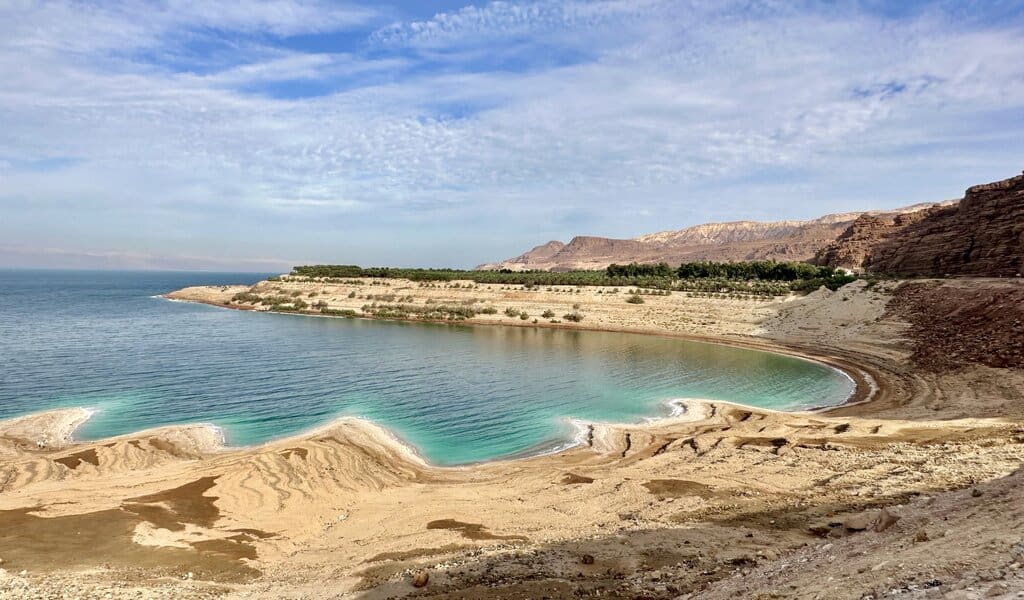
If you’re not staying at one of the resorts you can still go inside and have a meal or drink at one of the restaurants or bars. As usual, there are no liquor stores in or near Swemeh.
The Americans in the room next to us at the Marriott didn’t seem to care though, and kept ordering Amstel buckets on room service till 3 in the morning, being loud as hell, not allowing us to sleep. Don’t be like them!
Alcohol Prices in Jordan
Jordan is not exactly the cheapest place to go out and drink. As we already explained, taxes are high on alcohol and general goods. Even without the taxes in Aqaba the prices will still be similar to western countries.
Not including the liquor stores, where it’s obviously much cheaper to purchase alcohol, the cheapest beer I’ve seen in Jordan was in Amman and it was 5 JOD plus tax, so about $8 USD. It was more than the vast majority of the meals on the menu at this particular restaurant.
At the resorts and upscale hotels in the cities you can expect to pay a minimum of 6.50 JOD plus tax ($11ish) for an Amstel, and more for an imported beer or a Carakale craft beer. So if you’re looking for a cheap drinking vacation, Jordan is not it.
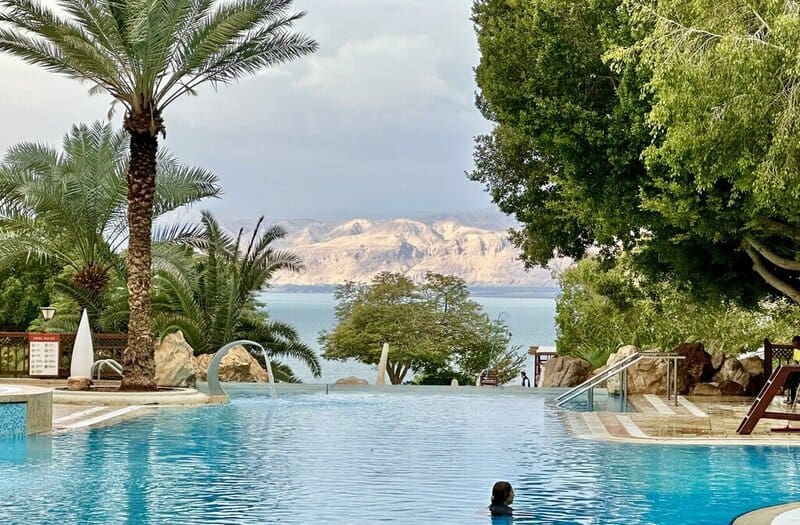
Glasses of wine start from about 6 JOD and usually that’s the local wine. For imported wine you’ll almost certainly have to order a bottle. Spirits are even more expensive, starting at about 7 JOD ($12) per drink and going up from there.
Needless to say, a night out drinking anywhere in Jordan will cost you a pretty penny!
Other Useful Jordan Tips
Here are a few other things to consider when you’re planning your trip to Jordan. It’s a beautiful country with lovely people and I’m sure you are going to love it.
Rent a car and drive around
Driving in Jordan is safe and an effective way to get around. You can visit all the main sites in Jordan on tours or using public transportation, but having your own car gives you priceless freedom when traveling around the country.
For renting cars in the Middle East we use Discovercars.com. You can find a great deal on a rental from Amman or anywhere in Jordan using the link below.
Click here to book a great deal on a rental car in Jordan!
Get the Jordan Pass
Before your trip you should purchase a Jordan Pass. Technically you don’t need one, but you absolutely should get it. It will make your trip to Jordan so much smoother.
Jordan Pass is like a museum pass for all the archaeological and historical sites and museums in Jordan. It also includes your Jordan entry visa, which alone is $60. Jordan pass comes with three options that are aligned to the three options for visiting Petra: a one day, two day, or three day Petra entry. All other sites are one day entries. The Jordan Pass is 70 JOD ($99), 75 JOD ($106), or 80 JOD ($113), respectively.
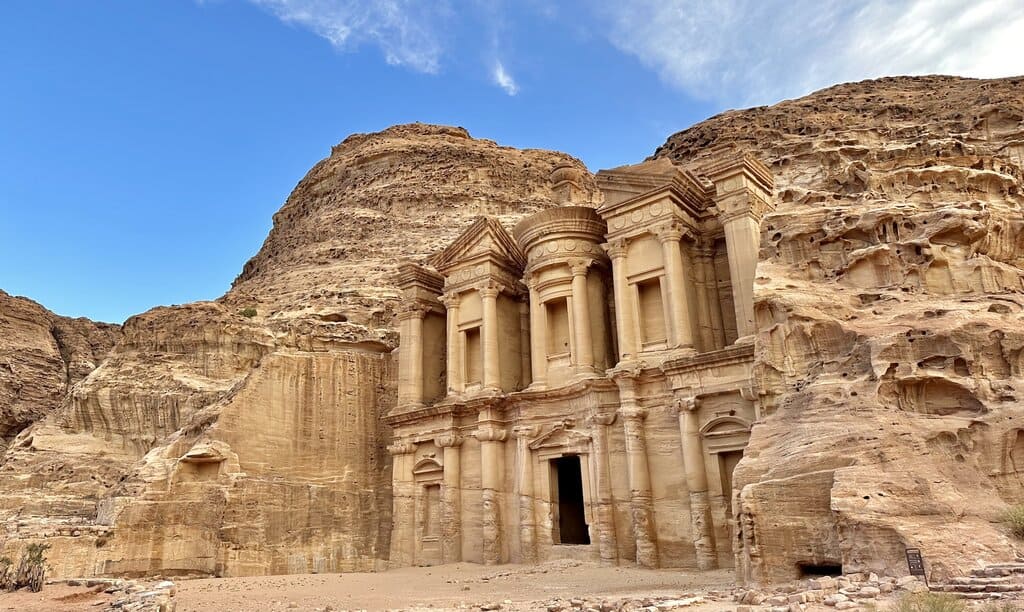
Even if you see nothing but Petra on your trip to Jordan it’s beneficial to have the Jordan Pass, as the price of a tourist visa plus Petra is more than Jordan Pass. You have to purchase it ahead of time and carry a printout or a PDF on your phone to gain entry to the sites. It expires after two weeks from when you enter Jordan at immigration, so keep that in mind if you’re planning longer than a 2-week trip.
Have travel insurance
Having travel insurance for a trip like Jordan is a really good idea. We use World Nomads when we travel internationally. World Nomads provides coverage to travelers in over 100 countries. You can find a great policy on World Nomads by using the link below.
Don’t visit in peak summer
Planning your trip around the brutal summer heat would be wise. Jordan is nearly entirely desert and it can be dangerously hot in July and August, even June and September.
Other than chilling at the Dead Sea, a trip to Jordan is a pretty active vacation, full of hiking, walking, and other aerobic activities. Hiking 20 km up and down mountains in Petra in 100 degree temperatures (38 C) is not exactly a great idea.
Have cash on you at all times
The Jordanian Dinar (JOD) is pegged to the US Dollar. That means that the currency is set to a fixed value to the dollar. 1 JOD is equal to 1.41 USD and it never changes. If you’re from the eurozone or Australia or elsewhere the stronger the US Dollar gets the more expensive your trip becomes.
You will need to carry cash when traveling around Jordan. While most restaurants and all hotels will take cards – even many souvenir stands in Petra – Jordan is still a cash-based society. You’ll want to carry enough cash to be able to get through a day without a credit card. Tipping is also common in Jordan for tour guides and other services.
PRO TIP: Some places in Jordan will try to charge you in your home currency when paying by credit card. When this is done the Jordanian government automatically adds a ridiculous 10% surcharge to the amount. Always – I repeat ALWAYS – pay in Jordanian Dinar.
Another thing to note is that prices in Jordan are negotiable. Many locals will try to rip you off so be sure to ask prices beforehand if no prices are displayed. And even then all prices can be haggled down. If you feel the price of something is too high you can make a counteroffer and they’ll often agree.
Frequently Asked Questions
Do supermarkets sell alcohol in Jordan?
No. In Jordan you have to go to a liquor store to purchase alcoholic beverages for personal consumption.
Why is alcohol so expensive in Jordan?
Alcohol is very expensive in Jordan, often more expensive than countries like the US or New Zealand. This is mainly due to the hefty taxes on alcohol that the government takes. You can avoid some of this by going to Aqaba, which is a tax-free zone, where you’ll save about 40% on alcohol purchases.
Is it illegal to be drunk in Jordan?
It is not illegal to be drunk in Jordan, but it is considered inappropriate and disingenuous to be drunk in public. While it’s one of the most liberal Muslim-majority countries, it’s still quite conservative and public displays of drunkenness are frowned upon.
Is there nightlife in Jordan?
Yes, there is nightlife in Jordan. Even for people who don’t drink alcohol, Amman is bustling at night. For those wishing to embibe, there is a range of drinking establishments in Amman and Aqaba to get your drink on into the night.
Alcohol in Jordan – Final Word
Now that we’ve gone through the rules and regulations around purchasing and consuming alcohol in Jordan, as well as the standard Jordanian alcohol selection and where you can and cannot purchase alcohol, you should have a pretty good idea of what to expect on your trip when it comes to beer, wine, and spirits.
If you only try one local drink in Jordan, I suggest the wine. Jordan River and Saint George both make great wine. Enjoy your trip (responsibly)!

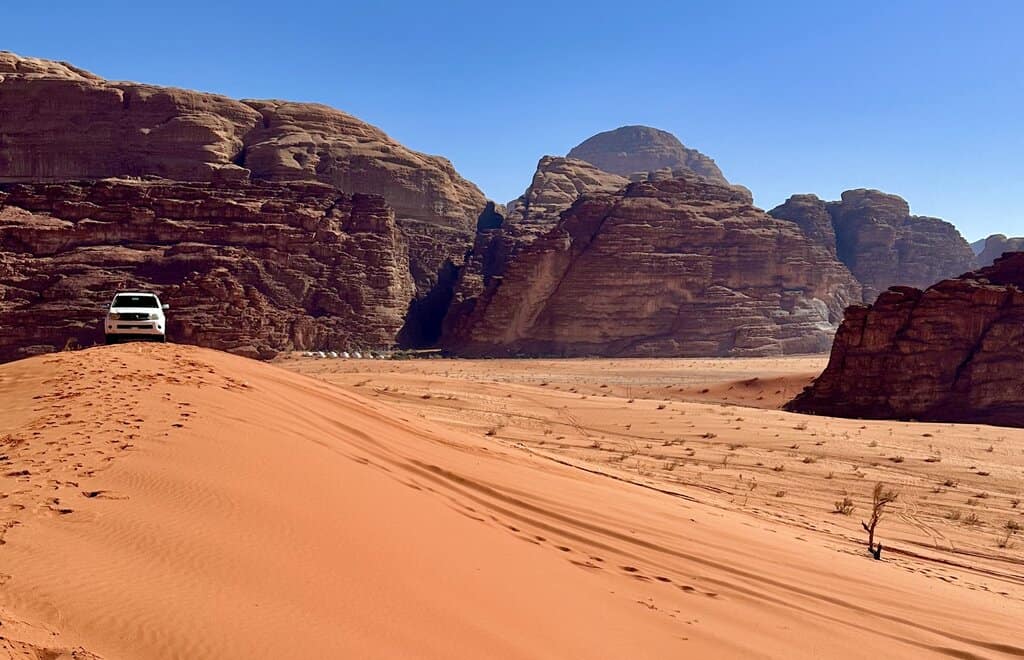
2 comments
The comment about not selling liquor to anyone during Ramadan is incorrect. Tourists can still get liquor at hotels and local restaurants with a liquor license.
Hi KT, that’s a good point. I hadn’t thought about the 5-star hotels and how they have their own rules. I’ve updated the section to clarify. Though from what I can tell, local restaurants outside of the hotels are not allowed to serve alcohol to anyone during Ramadan. Is that not correct?